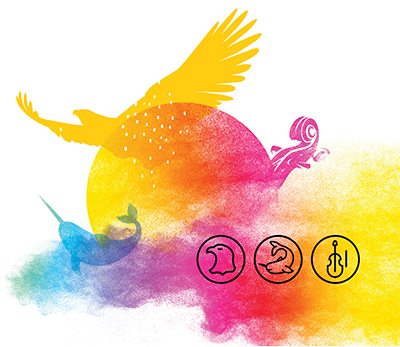Happy Indigenous Peoples Day! We are all treaty people and we have a responsibility to learn about the history, the treaty relationship, and the rich culture of the Mi'kmaq in Nova Scotia. There are so many ways to learn about our Mi'kmaq friends today, and about Indigenous People across the country. Here are some ways to do this today!
We encourage you to follow these Facebook pages to learn more about local issues and conversations that are going on in Nova Scotia:
- Nova Scotia Native Women's Association
- The Assembly of Nova Scotia Mi’kmaw Chiefs
- Mi'kmaq Rights Initiative
About the image:
Among the various visual elements illustrating Indigenous cultures, the sun (the summer solstice) is at the center which is at the heart of the festivities. The First Nations, Inuit and Métis as well as the four elements of nature (earth, water, fire and air) are represented in the image and shown opposite. The whole visual is supported by a multicolored smoke* reminding us of Indigenous spirituality but also the colors of the rainbow - symbol of inclusion and diversity of all First Nations, Inuit and Métis communities and their members.
- The eagle to represent the First Nations peoples
- The narwhal to represent the Inuit peoples
- The violin to represent the Métis peoples
- Smoke is used in different ways by all three Indigenous groups in Canada. Whether it is to smoke fish and meat, to burn sage and tobacco or for sacred ceremonies or celebrations, it is a significant symbol in Indigenous cultures.
Read, watch and listen
- Engage with books, films and music by Indigenous authors, artists and filmmakers.
- Follow creators and educators on platforms like the GC Indigenous Instagram account.
- Visit your local library or cultural centre for Indigenous storytelling events.
Explore Truth and Reconciliation
- Download the Reconciliation: A Starting Point app to learn about the history of residential schools, the 94 Calls to Action and Indigenous rights.
- Visit the National Centre for Truth and Reconciliation to hear directly from survivors.
- Read the final report of the National Inquiry into Missing and Murdered Indigenous Women and Girls.
Understand where you are
- Use the Native Land Digital map to learn whose traditional territory you live on.
- Research how to respectfully incorporate land acknowledgements in your personal or professional settings.
Amplify Indigenous Voices
Throughout June, share and celebrate Indigenous creators, leaders and community builders using the hashtag #NIHM2025.
Resources for Indigenous Mental Health Support
If you or someone you know needs mental health support, there are culturally-grounded and trauma-informed services available:
- Hope for Wellness Helpline: 1-855-242-3310 or chat online at ca
- Talk4Healing (for Indigenous women): 1-855-554-HEAL (4325)
- Kids Help Phone Indigenous Support: Text FIRST NATIONS, INUIT or METIS to 686868
